Daniel Harrwitz - The Great Improvisor
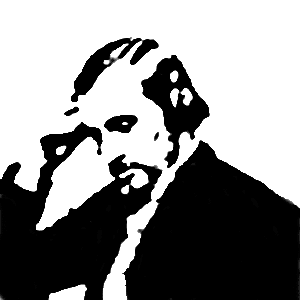
Daniel Harrwitz
Little is known of Harrwitz's early years but it is reasonable to believe the family had means. Harrwitz spent his later years sustained by an inheritance from his father so they must have had some status.
We know from accounts of the time that this contemporary of Adolf Anderssen was a fast player and also very quick witted with his remarks. He sometimes unnerved opponents by joking with the onlookers during a game.
Move to Paris
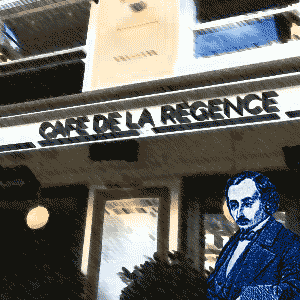
Daniel Harrwitz arrived in Paris around 1845
He would usually give more generous odds than most other strong masters. One exchange between himself and an amateur, supplied by G. A. Macdonnell, went as follows:
"What odds will you give me?" asked a provincial youth of a well-known player at the Divan, as they were arranging the pieces on a board close to the table at which I was sitting. "Well, let me see," said the celebrity. "How do you play with Mr. B. and Mr. O.?" (naming two magnates). "They give me a knight, and win a slight majority." "Then I will give you a rook."
London Tussle with Howard Staunton
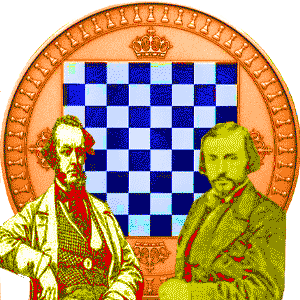
Howard Staunton won an unusual match against Daniel Harrwitz
7 games at pawn and 2 moves, 7 games at pawn and move and 7 games even. Staunton won the first phase 4-3. Harrwitz won the second 6-1. Staunton won the final part on even terms 7-0.
It wasn't such a bad result for Harrwitz. He was 23 and Staunton was at the height of his powers. The final result, 12-9, though arrived at in a bizarre manner was quite respectable for the Prussian.
Return to the Cafe
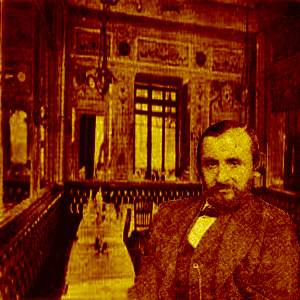
Daniel Harrwitz held court at the Café de la Régence
Harrwitz declined an invitation to the London Tournament of 1851 but Anderssen went and actually won it beating Marmaduke Wyvill in the final. Harrwitz won 2 matches against Elijah Williams in 1851. He won the first 7-0 and the second 7-2.
The following year saw a challenge on the horizon from the strong master Johann Lowenthal. The Prussian trailed 9-2 at one point in a race to 11 wins. He staged a remarkable comeback to win 11-10.
Harrwitz had at this point established himself as one of the strongest players in the world. Staunton refused to play a rematch against him. He returned to Paris in 1856 to become the club professional at the Café de la Régence.
Arrival of Morphy
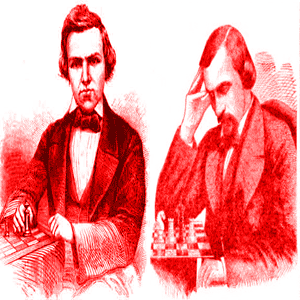
Paul Morphy inflicted a humbling defeat on Daniel Harrwitz
Morphy arrived in Paris eager to play the best masters in Europe. He beat some players in the Cafe and tried to arrange a match with Harrwitz.
Harrwitz consented to a casual game with Morphy to feel him out. The Prussian won a long game following early errors by the American. This encouraged him to arrange a formal match.
He started well winning the first two games but then Morphy hit his stride and started winning game after game. With the score at 5.5 - 2.5, Harrwitz resigned the match, baring to lose no more.
Retreat to Tyrol

Daniel Harrwitz retired to Tyrol in the Austrian Alps
He withdrew from top level chess after the loss against Morphy. He retired to Bozen, Tyrol in the Austrian Alps. There he lived comfortably on his inheritance from his father.
No more would Daniel Harrwitz grace the playing halls of the upper echelons of European chess. He was finished in top level competition and remained in Tyrol until his death in 1884.
Personality of Harrwitz
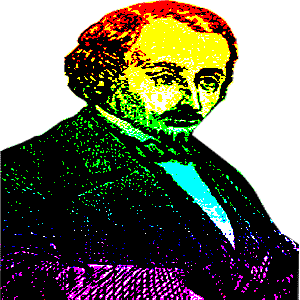
Daniel Harrwitz was quick with a quip and played quickly too
An amusing little incident occurred in that contest which I think is worth recording. In one of the games Staunton made a sacrifice whereby he expected to win; but Harrwitz retorted by also sacrificing a piece, and the result was that the Prussian emerged from the scrimmage with a superior game and a pawn ahead.
Somewhat chagrined at his discomfiture, Staunton muttered - "Dear me, dear me, I have lost a pawn!" in a voice and with an accent that indicated rather anger towards his opponent for his clever maneuver than blame towards himself for his faulty combination.
When he had repeated those words, "I have lost a pawn", several times, Harrwitz rang the bell sharply, and, upon the waiter appearing, he exclaimed - "William, will you kindly look about the floor for a pawn. Mr. Staunton has just lost one."
Moving On
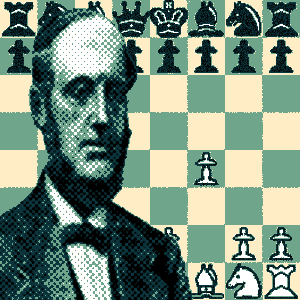
Chess Master - Henry Bird
Again we turn to G. A. Macdonnell: He had, undoubtedly, a genius of the highest order for chess, and it was only his restlessness, springing, no doubt, from delicacy of health, that prevented him from taking his place by the side of the very greatest masters.
That notwithstanding, he still carved out a sizeable reputation for himself in the game. He faced all of the best players of his time with favorable results against most. Another very exciting player from that era was Henry Bird.






